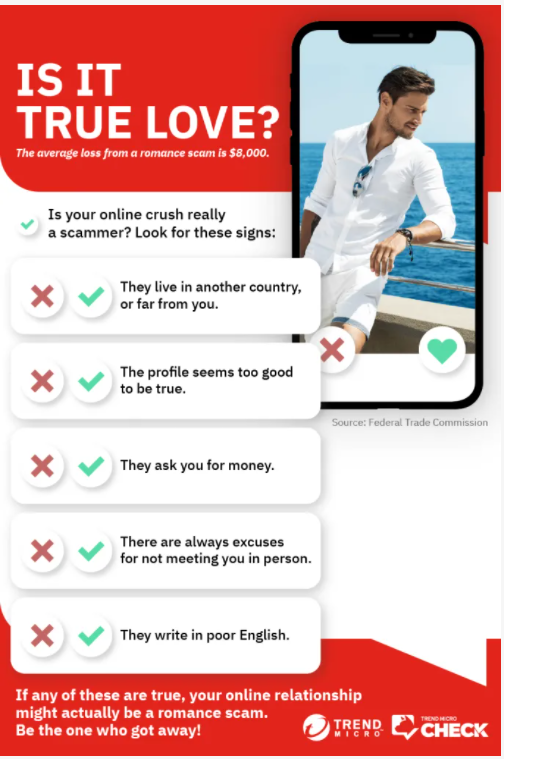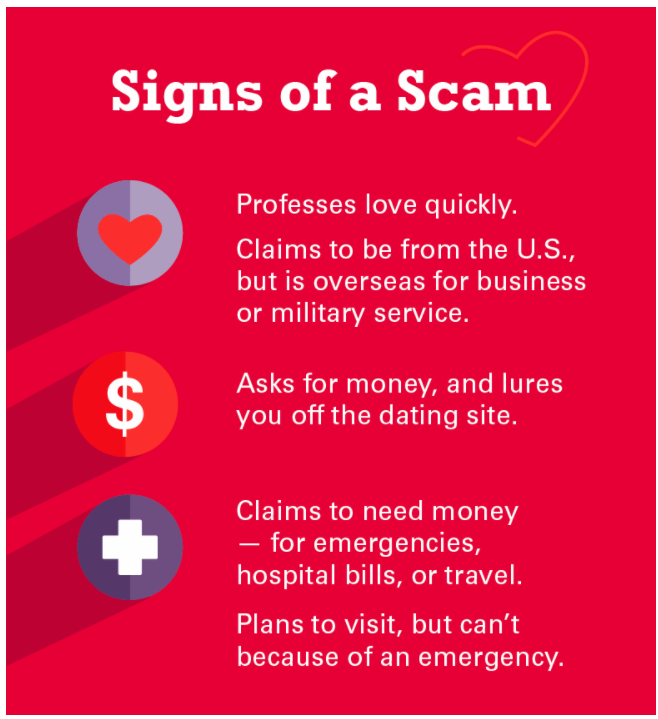Every year, thousands of people all over the world lose their money to what’s called a romance scam. In just the USA alone, victims lost $304 million in 2020. And that’s just the amount reported to the Federal Trade Commission (FTC). Many victims feel ashamed of having fallen for a romance scam thus do not report the crime, which means the losses are likely to be much higher.

What are romance scams?
Romance scams are a particular type of cybercrime that involves criminals adopting a fake online identity and establishing a romantic relationship with a victim in order to steal money from them. Romance scams are long-term as they involve months of talking to victims to create a close relationship. Romance scams usually follow particular patterns. One distinct characteristic of a romance scam is the scammer claiming to be overseas, often supposedly working in the construction industry or the military. This makes it easier to avoid in-person meetups, as well as makes emergencies where they ask for money more plausible.
TOP 5 ROMANCE SCAMS OF 2021
The so-called romance scammers are expert manipulators and often seem genuine and caring to victims. They are able to spot vulnerable victims, gather information about them, and then spend months developing a completely believable romantic relationship with them. Once they gain trust, it’s not uncommon for them to propose marriage. By the time victims realize what’s going on, they have already sent thousands of dollars to their partners who were supposedly in trouble.
If you or anyone close to you becomes a victim of a romance scam, you should report it to your local law enforcement agencies, particularly the cybercrime division. While recovering the stolen money is not always possible, it’s still worth reporting so that police are aware of the recent trends in romance scams and can better inform the public and prevent future possible victims. In the US, romance scams can be reported to the Internet Crime Complaint Center IC3.

How you can avoid romance scams
- Be careful about what you post online and make your social media profiles private.
Unless your work involves having an online presence, there is no reason to have public social media profiles. Making a profile private means only people you authorize will be able to see what you post. Predators can use your public social media profiles to gather information about your living situation, habits, etc., and then use it to target you and get closer to you. For example, if you post about your lavish lifestyle or about having difficulty finding love, you may become a target of romance scams. Scammers can also use your posted information to later establish shared interests, thus making you feel like there is a connection.
We also recommend that you do not connect your profiles on dating apps/sites with your social media. Furthermore, avoid using the same pictures on dating sites and social media. Scammers can find your social media profiles by reverse-searching your dating profile photo if it’s the same.
- Use a reverse search service to check the other person’s profile photos.
Scammers create fake social media and dating profiles using generic photos taken from the Internet. Fortunately, you can easily check this by using reverse image search services. There are various sites that provide this service but you can also simply use Google. Copy the image’s link, put it into Google, and an option to “search by image” should appear. This will provide all results where the same picture was used.
- Be careful about the information you give out and go slow.
Be careful about the information you provide, especially in the very beginning. You should also ask a lot of questions to the potential love interest and be skeptical of generic answers.
- Do not rush to leave the dating site and be careful about giving out your phone number.
Scammers and potential predators often try to pressure victims into switching from a dating app/site to communication via email, phone, or social media messaging services very early on. If a potential partner wishes to leave a dating site and communicate via email, create an alternative email and do not use one that can be connected to your social media accounts or your online presence. You should also only give away your phone number once trust has been established, preferably once you have met them in real life.
- Beware of attempts to isolate you from your family and friends.
Predators use various manipulation tactics to isolate victims from family and friends in order to take them away from their support system or prevent those close to them from warning them.
- Do not send private photos or anything that can later be used to extort money from you.
Predators often ask for highly personal information, such as secrets, as well as private photos in order to have something to use in case they wish to extort you for money. Only share private photos with people you trust and have met in real life. You should also do it with the mindset that they can be leaked online at any time.
- Be suspicious if the person you’re communicating with avoids meeting in person after some time.
It’s only natural to want to meet a potential love interest in real life after some time communicating online. However, if you are dealing with a romance scammer, they will always make up an excuse to not meet. To avoid making victims suspicious about why they cannot meet, scammers often claim to be overseas for business or military. So if a potential love interest is against meeting in real life after months of communication, that should raise alarms bells.
- Do not send money to people, even potential romantic partners, you have not met in real life.
Romance scams always have the same intention – stealing money. Once trust has been established with the victim, scammers will slowly start asking for money. They come up with all kinds of stories in order to pressure victims into sending them money. Popular ones include needing money for emergency medical expenses, and visa issues. If victims do not fall for this and refuse to send money, scammers may resort to extortion if, for example, they have a private picture of the victim. You should never send money to people you have not met in real life, even if they are a potential love interest.